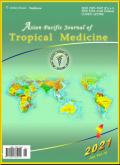Disease burden, antimicrobial resistance and molecular characterization of invasive group B Streptococcus among non-pregnant adults in Malaysia: A protocol study
IF 1.6
4区 医学
Q3 PUBLIC, ENVIRONMENTAL & OCCUPATIONAL HEALTH
引用次数: 0
Abstract
Objective: To determine the prevalence of group B Streptococcus (GBS) isolated from non-pregnant adults from seven major hospitals in Peninsular Malaysia; the incidence, case-fatality ratio, antimicrobial susceptibility patterns, serotype, genotype and distribution of the GBS virulence and pili genes are also investigated. Methods: This multicentre, prospective, observational study is conducted in seven major tertiary hospitals in Malaysia among non-pregnant adults. Simultaneously, a retrospective study is conducted in the selected hospitals with similar approaches. GBS isolates are subjected to phenotyping, serotyping by multiplex PCR, antimicrobial susceptibility testing and PCR-detection of GBS virulence and pilus genes. Seven housekeeping genes are amplified and sequenced for multi-locus sequence typing. Discussion: Findings from the study may contribute to the management of clinical practice to diagnose and prevent GBS related diseases in a timely manner. Prudent use of antibiotics is encouraged by monitoring antimicrobial resistance.马来西亚非怀孕成年人中侵袭性 B 组链球菌的疾病负担、抗菌药耐药性和分子特征:协议研究
目的确定从马来西亚半岛七家主要医院的非孕妇成人中分离出的 B 组链球菌(GBS)的流行率;同时调查 GBS 的发病率、病死率、抗菌药敏感性模式、血清型、基因型以及毒力基因和纤毛基因的分布情况。研究方法:这项多中心、前瞻性、观察性研究在马来西亚的七家主要三级医院的非孕妇成人中进行。同时,在选定的医院中以类似的方法进行回顾性研究。对分离出的 GBS 进行表型分析、通过多重 PCR 进行血清分型、抗菌药敏感性测试以及 PCR 检测 GBS 的毒力基因和柔毛基因。对 7 个看家基因进行扩增和测序,以便进行多焦点序列分型。讨论:研究结果有助于临床实践管理,及时诊断和预防 GBS 相关疾病。通过监测抗菌素耐药性,鼓励谨慎使用抗生素。
本文章由计算机程序翻译,如有差异,请以英文原文为准。
求助全文
约1分钟内获得全文
求助全文
来源期刊

Asian Pacific journal of tropical medicine
PUBLIC, ENVIRONMENTAL & OCCUPATIONAL HEALTH-TROPICAL MEDICINE
CiteScore
4.00
自引率
9.70%
发文量
1936
审稿时长
3-8 weeks
期刊介绍:
Asian Pacific Journal of Tropical Medicine (ISSN 1995-7645 CODEN: APJTB6), a publication of Editorial office of Hainan Medical University,is a peer-reviewed print + online Monthly journal. The journal''s full text is available online at http://www.apjtm.org/. The journal allows free access (Open Access) to its contents and permits authors to self-archive final accepted version of the articles on any OAI-compliant institutional / subject-based repository.
APJTM aims to provide an academic communicating platform for international physicians, medical scientists, allied health scientists and public health workers, especially those of the Asia-Pacific region and worldwide on tropical medicine, infectious diseases and public health, and to meet the growing challenges of understanding, preventing and controlling the dramatic global emergence and re-emergence of infectious diseases in the Asia-Pacific.
The journal is proud to have an international and diverse editorial board that will assist and facilitate the publication of articles that reflect a global view on tropical medicine, infectious diseases and public health, as well as emphasizing our focus on supporting the needs of public health practitioners. The APJTM will allow us to seek opportunities to work with others who share our aim, and to enhance our work through partnership, and to uphold the standards of our profession and contribute to its advancement.
 求助内容:
求助内容: 应助结果提醒方式:
应助结果提醒方式:


